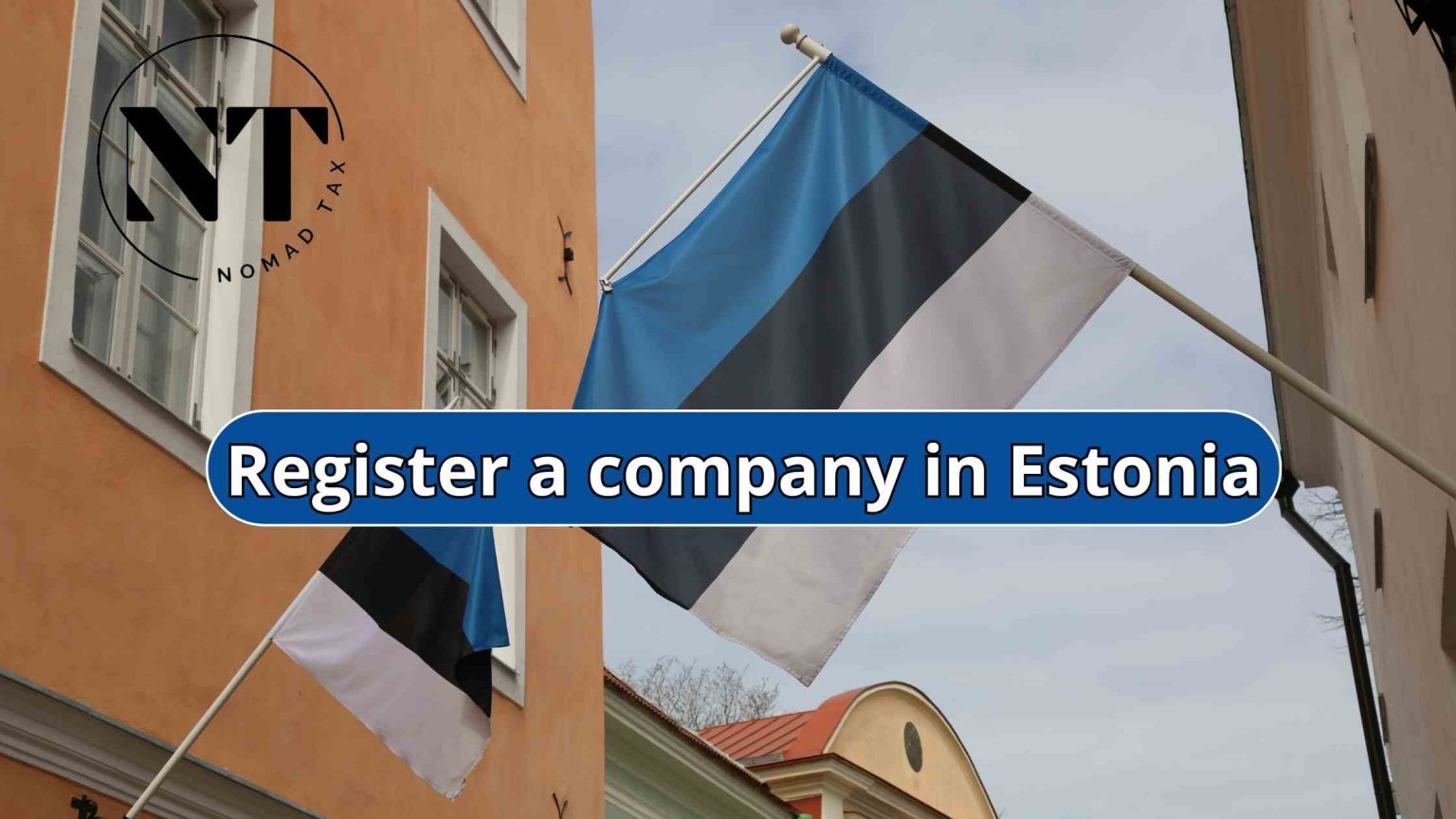If you’ve made it this far, you’re in luck. Today you will learn all about Estonia, its taxation and the costs involved in registering your business there.
Why does this country have the highest per capita rate of “unicorn” companies? Companies like Skype, Wise, Bolt, and others are registered in Estonia. Without a doubt, these companies knew what they were doing and chose the best jurisdiction.

Indice del artículo
Why do companies see the advantages of setting up a company in Estonia?
Estonia is a country that has gone unnoticed by many but surprises with its remarkable economic development and high level of well-being for its citizens.
This Baltic state, which uses the euro as its official currency and Estonian as its primary language, also has a significant part of the population that speaks English fluently. The climate in Estonia tends to be temperate, and its inhabitants are characterized by their discretion and respect for others.
Estonia is located in the northernmost region of Europe (yes, even further north than the Scandinavian Peninsula). It is situated south of the Gulf of Finland, in the Baltic Sea, separated from Finland by the said gulf and bordering with Russia. Russia and Estonia share a border through the Narva River and Lake Peipus, mainly.
It is one of the three Baltic republics, and to remember its relative location, you just need to alphabetically order their names: Estonia to the north, Latvia in the middle, and Lithuania to the south.

Estonia’s Business Strategy
Estonia’s business strategy is based on its advanced digital infrastructure and the belief that almost all activities can be carried out online with minimal resources and time loss. In this regard, they have developed the e-Residency program, designed to facilitate the creation and management of companies in Estonia for entrepreneurs and freelancers from around the world.
Thanks to Estonia’s membership in the European Union, e-Residents can access the same electronic services as Estonian citizens and run their businesses from anywhere, leveraging the common European market.
E-residency in Estonia
Estonia is a small country in Eastern Europe that lacks abundant natural resources or a large population. Therefore, they chose a different path to develop the country: digitalization. It is the most digitalized country in Europe, where virtually everything can be done digitally.
They were the first to implement digital voting for presidential elections, introduced e-schools, and, most importantly for entrepreneurs, e-residency.
This location-independent lifestyle approach has made e-Residency highly attractive to those looking for low-cost administration, ease of doing business, and tax advantages.
If you decide to operate a company located in Estonia, you can obtain e-residency… But don’t confuse it with tax residency or actual residence permits. E-residency, in short, is a means of authenticating a foreign person by Estonia.
It grants you the right to access almost all digital services available to citizens. You can register a company in Estonia and sign documents digitally, which is very convenient. If you have a company in one country, live in another, and constantly need to sign and send documents by mail, it can be inconvenient and time-consuming. In Estonia, you won’t have that problem.

Benefits of Creating a Company in Estonia
If you want to create a company in Estonia, here’s what you need to know:
- When opening your company in Estonia, founders and board members do not need to reside in the countrythere is no need for a local director.
- There is no obligation to pay a salary to the company director;
- no salary requirements exist.
- You do not need to contribute authorized capital for the formation of the company.
- You have the possibility to manage the company entirely remotely with e-Residency.
- A board member can apply for a residence permit for up to 5 years if they open their company in Estonia and manage it from this country.
- The acquisition of transportation and real estate owned by an Estonian company is tax-free.
- Estonia has double taxation avoidance agreements with 59 countries. It has a transparent and clear tax system without progressive taxes.
If you’re thinking of setting up your company in Estonia with NOMAD TAX, you can do it HERE.

How long does it take to open a company in Estonia?
From 2022 onwards, Estonia experienced a significant change in implementing qualified digital signatures.
At this point, all administrative procedures could be carried out online! Among many other things, with this system, you can now create a company in 10 minutes.
But not just anyone can do it. This is where e-Residency comes in. In fact, creating a company this way is only possible for Estonian citizens and those who hold e-resident status.
How to open a company in Estonia?
Regarding the time required to obtain e-residency, the details of this process are too extensive to cover here, but the procedure is not too complicated:
- The first step is to register on the e-Residency website.
- After providing some personal information, you only need to wait for a response from the Estonian Police and Border Guard Board, which usually takes an average of 20 days, although the theoretical deadline is 30 days. Additionally, the approval rate is around 85%.
- On the other hand, it is important to mention that, due to the situation in Ukraine, the Estonian government is scrutinizing applications from Russia more closely to prevent the creation of potentially problematic European companies, having suspended Russian applications in recent months.
- If the application is accepted, the person can pick up their e-Residency card at a nearby Estonian embassy within a period ranging from 2 to 5 weeks. This is the only procedure that requires physical presence, as fingerprinting is needed to confirm identity. Once you have the e-Residency kit, you can access various Estonian government services, including the ability to establish a digital company.

How does a company pay taxes in Estonia?
Estonia has a unique tax system that only a few countries in the world have. Companies in Estonia do not pay corporate income taxes; they only do so when distributing dividends.
So, no matter how much the company earns, whether it’s a hundred thousand or a million, it doesn’t matter; the corporate income tax in Estonia is 0%. Only when the Estonian company decides to distribute dividends, it must pay a 20% tax on those distributed profits.
How is it calculated? For example, if the Estonian company has revenues of 200,000 EUR but only wants to distribute 100,000 EUR as dividends, it means the company will pay 20,000 EUR in taxes to the government, and the remaining 80,000 EUR will be transferred to the shareholders’ account.
This is one of the main advantages of creating a company in Estonia. Most new companies will want to reinvest the money they earn to develop the company, expand their product, and make it even bigger. Estonia, instead of taking taxes from you right away, gives you this wonderful option to grow your company.
Tax rates & Income Tax in Estonia
Estonia, like other countries, obliges employees to pay income tax, known as personal income tax. However, income taxes in Estonia are characterized by their simplicity and lower tax rates compared to other countries.
In Estonia, all income from work is subject to a fixed tax rate of 20%. This means that regardless of a person’s income level, their tax obligation will be equal to 20% of their gross salary. This tax system is fair and, above all, easy to understand for both workers and businesses.
It is important to note that this 20% rate also applies to self-employed workers who operate on their own account. In summary, Estonia offers a transparent and equitable income tax system, making personal and business financial management straightforward.

What VAT is paid in Estonia?
VAT in Estonia is imposed on goods and services sold in the business sphere, as well as on imports of goods from countries outside the European Union and purchases of goods from EU member states. The final consumer bears the burden of this tax.
Companies are required to obtain a VAT registration number in Estonia when their sales exceed 40,000 EUR from the beginning of the calendar year. Furthermore, it is possible to apply for VAT registration before reaching this sales threshold.
You must file VAT in Estonia monthly, but most likely, your accountant will take care of it, and since they are relatively inexpensive, it is not a major inconvenience in the end. The VAT rate in Estonia is 20%.
Therefore, the main advantages of operating your company in Estonia are as follows:
- You don’t pay taxes in Estonia when you reinvest profits.
- The cost of living in Estonia is low, which means that if you need employees for your Estonian company, you can find highly qualified employees in Estonia, and salaries will not be high.
Another advantage of setting up your company in Estonia is that you can bring your team to Estonia from another country, as they have some migration programs, making it relatively easy to move there. And since the cost of living is low, keeping your company in Estonia is also cost-effective.
Even if you need to have a local representative, an accountant and possibly an auditor there, depending on the scope of the company’s activity and turnover, as it is an inexpensive country, all these services will not cost you much.
Disadvantages of having a company in Estonia
What really is a disadvantage when creating a company in Estonia is banking. No bank in Estonia will open an account for you unless you actually produce something and have a real presence there. Of course, if you are an Estonian citizen, that wouldn’t be a problem.
But if you are a foreigner and register a company in Estonia and only plan to pay the accountant, lawyer, maybe some service provider, and for the office, it won’t be enough substance to open a bank account. Banks want to see at least 70% of your company’s revenue generated in Estonia.
The positive aspect here is that you are not obligated to have a bank account in Estonia; you can open one elsewhere abroad. However, that’s not an easy option either if you don’t have real business activity in those countries. That’s why most companies open accounts with payment systems.

The most common options for registering your business in Estonia are:
Limited Liability Company (OÜ) and Public Limited Company (AS). OÜ is the most popular form due to its simple and fast registration process, relatively low share capital, and the absence of personal liability of shareholders for the company’s obligations.
On the other hand, AS is suitable for larger projects with higher capital requirements and the possibility of going public. There are also other legal forms, such as a Partnership (TÜ) and a Limited Partnership (UÜ), which can be useful in certain business contexts.
The option of a Business Association (Tulundusühistu) or even operating as a Sole Proprietor (FIE) can also be considered. Nomad Tax specializes in the taxation of the Baltic country.
Manage a company in Estonia while residing abroad
We have already confirmed that it is possible to operate a company in Estonia while residing in another country, but how is it achieved?
As mentioned earlier, e-Residency offers you the opportunity to open and manage your company in Estonia regardless of your physical location since it provides you with a digital identity that allows you to access Estonia’s digital services.
This means you can complete a variety of procedures regardless of your geographical location, from signing documents to opening a bank account.
Advantages of opening an Estonian company while residing abroad
The benefits of opening a company in Estonia while residing in another country are quite evident, aren’t they?
On the one hand, you can enjoy the advantages of living in another country like for expample Spain, Portugal, or Italia, such as its quality of life, gastronomy, and unparalleled Mediterranean sun and climate. It’s no wonder that many online entrepreneurs decide to establish their residence there.
And, on the other hand, you can take advantage of the benefits of opening and managing a company in Estonia thanks to e-Residency:
- A fair and easy-to-understand tax system. Unlike what you experienced as a self-employed person in Spain, when operating your company in Estonia, you will have a coherent tax system that supports digital entrepreneurs instead of putting obstacles in their way. In fact, all the profits from your company that you reinvest in it are tax-free.
- A simple and fast process for setting up your online business. Obtaining e-Residency may take a little longer, but it generally takes one or two weeks at most. However, opening and registering your company in Estonia is very quick and easy.
- Paperless procedures. All procedures are done online, except when you need to pick up your e-resident kit in Estonia at a delivery point.
- Active entrepreneur community. E-Residency has a community of over 100,000 entrepreneurs, and events are regularly organized, helping you meet other people in your situation and establish connections.
- Having a trusted European company. Estonia has a good reputation for businesses due to its policy of transparency, low corruption levels, and strict compliance with laws and regulations.
Undoubtedly, having a company in Estonia while residing in another country is very attractive, but it is also important to consider the specificities of your business to determine if this is the best option for you.
But can everyone open their company in Estonia from abroad?
The e-Residency program was created to allow anyone, regardless of their nationality or country of residence, to open a company in Estonia and manage it online from another country.
It is an ideal solution for online businesses, freelancers, small businesses, and startups.
However, there are three cases in which we do not recommend opening an Estonian company from another country:
❌ You should not open a company in Estonia if you need a permanent office or facilities outside of Estonia. For example, if you have a restaurant in Italy, a permanent physical presence in Italy and hiring employees will be required, making you a 100% tax resident in Italy.
❌ You should not open a company in Estonia if you deal with physical products. If you buy, sell, import, export, or handle physical goods, you may need a physical presence in another country (e.g., a warehouse). However, having a company in Estonia could be viable in the case of dropshipping or FBA businesses.
How much does it cost to open a company in Estonia?
It’s no secret that establishing a company in Estonia is affordable; in fact, you can do it yourself. However, if you don’t have the time to handle all the procedures and prefer to benefit from the expertise of a professional agency, NOMAD TAX can provide comprehensive assistance in the process of opening your company in Estonia. You can check our prices and services on our website HERE.
In conclusion
Setting up a company in Estonia is a smart choice for global entrepreneurs. With Estonia’s e-Residency, you can enjoy tax benefits, such as a 0% corporate income tax on retained earnings, and manage your business remotely from Spain or anywhere in the world.
Before making a decision, it’s essential to consider your specific business needs and consult with a tax professional or legal advisor to ensure that opening a company in Estonia aligns with your goals and objectives.
Keep in mind that tax laws and regulations can change over time, so it’s crucial to stay informed and adapt your business structure accordingly. Whether you decide to establish your company in Estonia or explore other options, careful planning and research are key to your business’s success.
FAQ
What are the benefits of starting a company in Estonia? Estonia offers several advantages for entrepreneurs, such as a 0% corporate income tax, the possibility of remote management with e-Residency, advanced digital infrastructure, and preferential taxes. Additionally, founders do not need to reside in Estonia, and company properties and transportation can be acquired tax-free.
What is Estonia’s e-Residency? Estonia’s e-Residency is a program that allows non-residents to establish and manage a company in Estonia remotely. With e-Residency, entrepreneurs have equal access to electronic services as Estonian residents. However, residing in Estonia is also an option.
What is the most common business form in Estonia? The most common business form in Estonia is a Private Limited Company (OÜ). It is a popular choice due to its straightforward registration, relatively low share capital, and limited liability of shareholders for company obligations.
Is it necessary to live in the country to create a company in Estonia? No, it is not necessary to reside in Estonia to establish a company there. With e-Residency, entrepreneurs can manage their business remotely from anywhere in the world.
What requirements must be met to obtain Estonia’s e-Residency? To obtain e-Residency, applicants must fulfill the following requirements: submit an online application, provide their personal data, and pay the corresponding fee. It’s important to note that e-Residency is not citizenship or a physical residence permit.
How long does it take to create a company in Estonia? The time to register a company in Estonia can vary depending on the type of registration and the method used. For example, online registration can take just a few hours, while registration through a notary can take up to 5 business days.
What is the minimum share capital required to create a company in Estonia? The minimum share capital required to open a company in Estonia depends on the type of entity. For a Private Limited Company (OÜ), the share capital can be as low as 2,500 euros.
Is it necessary to have a local Director to create a company in Estonia? No, it is not necessary to have a local Director to open a company in Estonia. Founders and board members can reside anywhere in the world.
What types of company registration are available in Estonia? Options for company registration in Estonia include registration with an electronic residence card, in-person registration, and registration through a notarial power of attorney.
What taxes do companies in Estonia have to pay? Estonia offers a 0% corporate tax on retained earnings. However, when distributing dividends, you will need to pay a 20% corporate income tax.
If you want more from our YouTube channel you can follow us here



